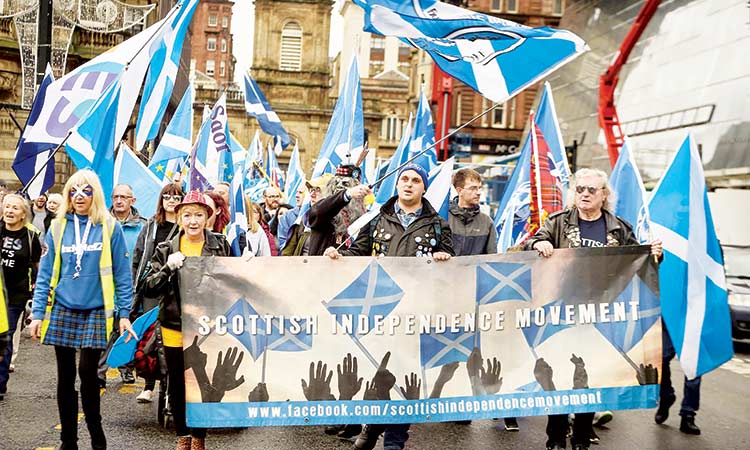Thousands march for Scottish independence
Sun 03 Nov 2019, 11:10:55

Thousands rallied in Glasgow on Saturday calling for Scotland to become an independent country, with First Minister Nicola Sturgeon telling the crowds that their goal was “within touching distance.”
The Scottish National Party (SNP) leader was the headline speaker at the event in George Square, the first time she has addressed an independence rally since the 2014 referendum campaign, with a crucial general election looming next month.
“Make no mistake, the general election we face now on Dec.12 is the most important election for Scotland in our lifetimes,” she told the crowds.
“The future of our country is on the line. We must come out in our numbers and vote in this election,” she added, insisting that the “prize” of independence was “within touching distance.”
“We must seize that prize,” she urged.
Sturgeon is expected, before Christmas, to formally ask Johnson for a Section 30 order, which would give Scotland’s devolved government permission to stage a referendum.
Supporters waved the St Andrews cross emblazoned with the word “Yes” and Catalan flags in solidarity with the fellow independence campaign.
Others wore kilts and played bagpipes, including one musician who had flames leaping from his instrument.
Sturgeon promised supporters on Saturday to “lead you to an independence reference next year.”
“It’s time for Scotland to choose our own future, time for Scotland to be an independent country,” she added.
A small number of pro-Union protesters carrying Union Jack flags staged a counter-demonstration.
Meanwhile, British Prime Minister Boris Johnson sparked an angry backlash from Brexit Party leader Nigel Farage on Saturday after he rejected calls to drop his Brexit deal and embrace a clean break from the EU, potentially splitting the eurosceptic vote.
Johnson had previously pledged to take Britain out of the EU with or without a deal on Oct.31, before lawmakers voted to force him to seek
an extension until Jan.31.
an extension until Jan.31.
But he has abandoned the threat of a no-deal Brexit in his Conservative Party’s manifesto for the Dec.12 election, the Times newspaper reported on Saturday. It added that the focus would be on getting his Brexit deal approved.
On Friday, Johnson rejected a call from the Brexit Party to drop the deal he negotiated with the EU last month in order to form a new electoral pact, saying that he could put his deal through parliament after any election win.
“What we’ve got is a fantastic deal that nobody thought we could get,” Johnson said.
“As soon as we get back in the middle of December, we can put that deal through.”
“If The Times are right and Boris Johnson will abandon a clean break Brexit, and he wins an election on this, we will never be free of EU rules,” Farage said in a tweet.
“The deal is simply not Brexit and does not get Brexit done.”
Farage on Thursday interviewed US President Donald Trump, who said that Jeremy Corbyn, leader of Britain’s opposition Labour party, would be “so bad” for Britain.
On Saturday, Corbyn said Trump was entitled to his opinion but again warned of the dangers of a trade deal with the United States, saying it threatened Britain’s public National Health Service, a claim Johnson and Trump both deny.
“The reality of no-deal is (heading) straight into the arms of Donald Trump. Straight into the arms of a free trade deal with the USA and their desire to take over our public services,” Corbyn said at a rally in Swindon, 120km west of London.
“We will not go down that path under any circumstances. Our public services, our national health service is not for sale, to Donald Trump or anybody else.”
Both major parties face battles on at least three fronts: Against each other, with the hardline Brexit Party seeking to poach leave voters, and with the Liberal Democrats seeking to win over those who oppose Brexit altogether.
Opinion polls give Johnson a sizeable lead over Labour, but also suggest that more than 10 per cent of voters back the Brexit Party - enough to split the pro-Brexit vote in some seats and hand victory to Labour.
No Comments For This Post, Be first to write a Comment.
Most viewed from International
Most viewed from World
AIMIM News
Latest Urdu News
Most Viewed
May 26, 2020
Do you think Canada-India relations will improve under New PM Mark Carney?
Latest Videos View All
Like Us
Home
About Us
Advertise With Us
All Polls
Epaper Archives
Privacy Policy
Contact Us
Download Etemaad App
© 2025 Etemaad Daily News, All Rights Reserved.

.jpg)
.jpg)
.jpg)






.jpg)


.jpg)
.jpg)
.jpg)
.jpg)
.jpg)
.jpg)
.jpg)
.jpg)
.jpg)
.jpg)
.jpg)
.jpg)

















